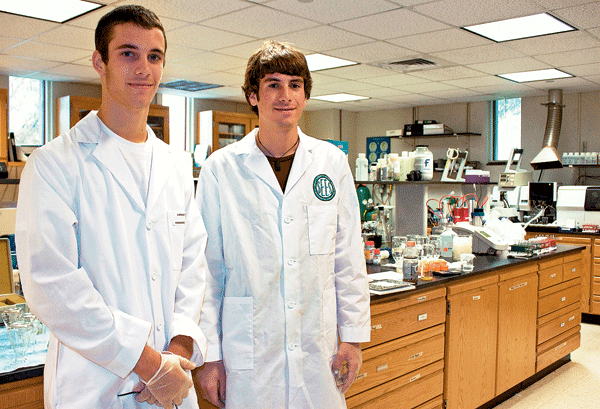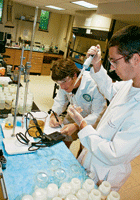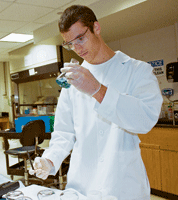Award-Winning Undergraduate Research

Brian Peacock ’12 and Michael Thompson ’12 are two of many Lafayette engineering students who win prestigious fellowships
Civil engineering major Brian Peacock ’12 is fascinated with the field of ecological engineering, which uses artificial ecosystems to treat and use waste. He plans to pursue a Ph.D. in the field and is preparing research on wetlands that will become his senior honors thesis.
It’s a project that will be funded in part by an Environmental Protection Agency-Greater Research Opportunity (EPA-GRO) fellowship. Peacock and fellow civil engineering major Michael Thompson ’12 both received fellowships for the 2010-11 school year. The awards will finance research supplies and provide tuition assistance and a stipend during the semester. Each student also will serve a three-month internship with the EPA.
For Thompson, who turned a childhood fascination with Lego blocks into a an interest in engineering, the fellowship allows him to continue his current projects while getting a taste of what research will be like after Lafayette.
“Engineering is basically just solving problems, and I enjoy solving problems,” he says. “Working for the EPA instead of the College will be a change into a new environment, which sounds fun.”
Both students credit the undergraduate opportunities available at Lafayette with helping them develop the research chops needed to secure the EPA-GRO fellowships. Although they are just beginning their junior years, the College has served as a launching pad for their research careers.
 Peacock has been working in the lab and on site with Art Kney, associate professor of civil and environmental engineering, on his research on constructed wetlands. Their work was presented at the 2010 ASCE World Environmental & Water Resources Congress and published in the conference proceedings. He previously conducted research with Kney and other students on nitrogen cycling in municipal waste compost.
Peacock has been working in the lab and on site with Art Kney, associate professor of civil and environmental engineering, on his research on constructed wetlands. Their work was presented at the 2010 ASCE World Environmental & Water Resources Congress and published in the conference proceedings. He previously conducted research with Kney and other students on nitrogen cycling in municipal waste compost.
“The research facilities are outstanding and the small size of the school has enabled me to access all of the facilities with unprecedented ease,” says Peacock. “It has been great to work closely with professors and have the freedom to explore my own ideas.”

Thompson agrees that the one-on-one attention from faculty has helped him excel. He has been working with Kney and David Brandes, associate professor of civil and
environmental engineering, to develop a graphical screening method that can predict the quality of stream water.
The method can test a water sample for hardness and electrical conductivity, and then plot the results on the graph. The location of the plot point determines if the water is clean or impacted. They are preparing a paper to submit to the Journal of Environmental Management.
“It’s like nothing I ever imagined a small school could offer for a science-based program,” he says. “I believe I have received a better education and experience here than I could have at any technical institute.”
In 2010, 95% of Lafayette’s candidates (currently enrolled) passed the Fundamentals of Engineering Examination
